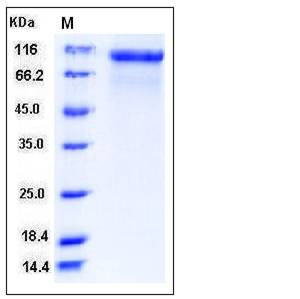Rhesus HER2 / ErbB2 Protein (His Tag)
ErbB2, p185erbB2
- 100ug (NPP1537) Please inquiry
| Catalog Number | P90020-K08H |
|---|---|
| Organism Species | Rhesus |
| Host | Human Cells |
| Synonyms | ErbB2, p185erbB2 |
| Molecular Weight | The recombinant Rhesus ErbB2 consists of 640 amino acids and predicts a molecular mass of 70.7 kDa. As a result of glycosylation, rhesus ErbB2 migrates as an approximately 105 kDa band in SDS-PAGE under reducing conditions. |
| predicted N | Gln 24 |
| SDS-PAGE |  |
| Purity | > 95 % as determined by SDS-PAGE |
| Protein Construction | A DNA sequence encoding the Rhesus ErbB2 (XP_001090430.1) extracellular domain (Met 1-Thr 652) was fused with a polyhistidine tag at the C-terminus. |
| Bio-activity | Measured by its binding ability in a functional ELISA . Immobilized rhesus Erbb2 at 2.5 μg/ml (100 μl/well) can bind Herceptin with a linear ranger of 6.4-160 ng/ml. |
| Research Area | Cardiovascular |Angiogenesis |Growth Factor & Receptor |Receptor Tyrosine Kinase (RTK) |
| Formulation | Lyophilized from sterile PBS, pH 7.4 1. Normally 5 % - 8 % trehalose and mannitol are added as protectants before lyophilization. Specific concentrations are included in the hardcopy of COA. |
| Background | Human epidermal growth factor receptor 2 (HER2), also known as ErbB2, NEU, and CD340, is a type I membrane glycoprotein, and belongs to the epidermal growth factor (EGF) receptor family. HER2 protein cannot bind growth factors due to the lacking of ligand binding domain of its own and autoinhibited constitutively. However, HER2 forms a heterodimer with other ligand-bound EGF receptor family members, therefore stabilizes ligand binding and enhances kinase-mediated activation of downstream molecules. HER2 plays a key role in development, cell proliferation and differentiation. HER2 gene has been reported to associate with malignancy and a poor prognosis in numerous carcinomas, including breast, prostate, ovarian, lung cancers and so on. |
| Reference |
